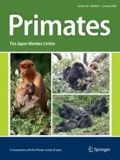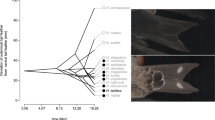Abstract
Humans are thought to be unique in their ability to help others voluntarily even though it may sometimes incur substantial costs. However, there are a growing number of studies showing that prosocial behaviors can be observed, not only in humans, but also among nonhuman primates that live in complex social groups. Prosociality has often been described as a major factor that facilitates group living. Nonetheless, it has seldom been explored whether solitary living primates, such as orangutans, share this propensity. In the present study, we tested four captive orangutans (Pongo abelii × pigmaeus, Pongo pigmaeus) in a simple food-delivering task. They had a choice, incurring the same cost, between getting a food reward for themselves and providing an additional food reward to a conspecific recipient passively sitting in an adjacent booth. Two orangutans played the actor’s role, and two orangutans participated as recipients. The results showed that the actors did not choose to deliver food to the recipients more often than expected by chance (51.3 % on average). The control condition demonstrated that this tendency was independent of the actor’s understanding of the task. These findings suggest that orangutans do not spontaneously share benefits with other conspecifics, even when the prosocial choice does not disadvantage them. This study gives the first experimental evidence that socially housed captive orangutans do not behave prosocially in a choice paradigm experiment. Further studies using a different experimental paradigm should be conducted to examine whether this tendency is consistent with previous findings hypothesizing that the enhanced prosocial propensity shown in humans and other group living primates is an evolutionary outcome of living in complex social environments.




Similar content being viewed by others
References
Altmann J (1974) Observational study of behavior: sampling methods. Behaviour 49:227–267
Axelrod R, Hamilton WD (1981) The evolution of cooperation. Science 211(4489):1390–1396
Amici F, Visalberghi E, Call J (2014) Lack of prosociality in great apes, capuchin monkeys and spider monkeys: convergent evidence from two different food distribution tasks. Proc R Soc B: Biol Sci 281(1793):20141699
Barnes JL, Hill T, Langer M, Martinez M, Santos LR (2008) Helping behaviour and regard for others in capuchin monkeys (Cebus apella). Biol Lett 4:638–640
Burkart JM, Fehr E, Efferson C, Van Schaik CP (2007) Other-regarding preferences in a non-human primate: common marmosets provision food altruistically. PNAS 104:19762
Burkart J, Allon O, Amici F, Fichtel C, Finkenwirth C, Heschl A, Huber J, Isler K, Kosonen Z, Martins E (2014) The evolutionary origin of human hyper-cooperation. Nat Commun 5:4747. doi:10.1038/ncomms5747
Call J, Tomasello M (1994) The social learning of tool use by orangutans (Pongo pygmaeus). Hum Evol 9:297–313
Chalmeau R, Lardeux K, Brandibas P, Gallo A (1997) Cooperative problem solving by orangutans (Pongo pygmaeus). Int J Primatol 18:23–32
Custance D, Whiten A, Sambrook T, Galdikas B (2001) Testing for social learning in the “artificial fruit” processing of wildborn orangutans (Pongo pygmaeus), Tanjung Puting, Indonesia. Anim Cogn 4:305–313
Davila-Ross M, Menzler S, Zimmermann E (2008) Rapid facial mimicry in orangutan play. Biol Lett 4:27–30
Drayton LA, Santos LR (2014) Capuchins’(Cebus apella) sensitivity to others goal-directed actions in a helping context. Anim Cogn 17:689–700
Horner V, Carter JD, Suchak M, de Waal FBM (2011) Spontaneous prosocial choice by chimpanzees. PNAS 108:13847–13851
House BR, Silk JB, Lambeth SP, Schapiro SJ (2014) Task design influences prosociality in captive chimpanzees (Pan troglodytes). PLoS One 9(9):e103422
Jaeggi AV, van Noordwijk MA, van Schaik CP (2008) Begging for information: mother-offspring food sharing among wild Bornean orangutans. Am J Primatol 70:533–541
Lakshminarayanan VR, Santos LR (2008) Capuchin monkeys are sensitive to others welfare. Curr Biol 18:R999–R1000
Liebal K, Vaish A, Haun D, Tomasello M (2014) Does sympathy motivate prosocial behaviour in great apes? PLoS One 9(1):e84299
Melis AP, Warneken F, Jensen K, Schneider AC, Call J, Tomasello M (2011) Chimpanzees help conspecifics obtain food and non-food items. Proc R Soc B 278:1405–1413
Poole TB (1987) Social behavior of a group of orangutans (Pongo pygmaeus) on an artificial island in Singapore Zoological Gardens. Zoo Biol 6:315–330
Preston SD, de Waal F (2002) Empathy: its ultimate and proximate bases. Behav Brain Sci 25:1–20
Silk JB, Brosnan SF, Vonk J, Henrich J, Povinelli DJ, Richardson AS, Lambeth SP, Mascaro J, Schapiro SJ (2005) Chimpanzees are indifferent to the welfare of unrelated group members. Nature 437:1357–1359
Skerry A, Sheskin M, Santos L (2011) Capuchin monkeys are not prosocial in an instrumental helping task. Anim Cogn 14:647–654
Stoinski TS, Whiten A (2003) Social learning by orangutans (Pongo abelii and Pongo pygmaeus) in a simulated food-processing task. J Comp Psychol 117:272–282
Suchak M, de Waal FBM (2012) Monkeys benefit from reciprocity without the cognitive burden. PNAS 109:15191–15196
Tajima T, Kurotori H (2010) Nonaggressive interventions by third parties in conflicts among captive Bornean orangutans (Pongo pygmaeus). Primates 51:179–182
Takimoto A, Fujita K (2011) I acknowledge your help: capuchin monkeys sensitivity to others labor. Anim Cogn 14:715–725
Takimoto A, Kuroshima H, Fujita K (2010) Capuchin monkeys (Cebus apella) are sensitive to others’ reward: an experimental analysis of food-choice for conspecifics. Anim Cogn 13:249–261
Tan J, Kwetuenda S, Hare B (2014) Preference or paradigm? Bonobos show no evidence of other-regard in the standard prosocial choice task. Brill
Trivers RL (1971) The evolution of reciprocal altruism. Q Rev Biol 46(1):35–57
van Noordwijk MA, van Schaik CP (2009) Intersexual food transfer among orangutans: do females test males for coercive tendency? Behav Ecol Sociobiol 63:883–890
Van Schaik CP, Ancrenaz M, Borgen G, Galdikas B, Knott CD, Singleton I, Suzuki A, Utami SS, Merrill M (2003) Orangutan cultures and the evolution of material culture. Science 299:102–105
Vonk J, Brosnan SF, Silk JB, Henrich J, Richardson AS, Lambeth SP, Schapiro SJ, Povinelli DJ (2008) Chimpanzees do not take advantage of very low cost opportunities to deliver food to unrelated group members. Anim Behav 75:1757–1770
Warneken F, Tomasello M (2006) Altruistic helping in human infants and young chimpanzees. Science 311:1301
Yamamoto S, Takimoto A (2012) Empathy and fairness: psychological mechanisms for eliciting and maintaining prosociality and cooperation in primates. Soc Just Res 25:233–255
Yamamoto S, Tanaka M (2009) Selfish strategies develop in social problem situations in chimpanzee (Pan troglodytes) mother-infant pairs. Anim Cogn 12:27–36
Yamamoto S, Humle T, Tanaka M (2009) Chimpanzees help each other upon request. PLoS One 4(10):e7416
Zucker EL, Dennon MB, Puleo SG, Maple TL (1986) Play profiles of captive adult orangutans: a developmental perspective. Dev Psychobiol 19:315–326
Acknowledgments
This research was financially supported by a JSPS Grant-in-Aid for Scientific Research (#23220006 to MT and #25666 to YK) and by the Global COE program to Kyoto University from MEXT, Japan. The work was also supported by the Ewha Global Top5 Grant 2013 of Ewha Womans University. We are thankful to the Director Jeong Rae Rho and the zookeepers at the Seoul Zoo for helping us to accomplish the experiment. We also thank the primate team of Ewha Womans University for their assistance, especially Wonhee Lee, Haneul Jang, Yoonsoo Choi, and other volunteer students. This study could not have been conducted without the support of Prof. Tetsuro Matsuzawa, Prof. Misato Hayashi, Prof. Ikuma Adachi, and the CICASP (Center for International Collaboration and Advanced Studies on Primatology) members of Primate Research Institute. We are also very grateful to Prof. Michael A Huffman, Dr. Noko Kuze, Tomoyuki Tajima, and Yuki Hanazuka for their invaluable comments. The current study adhered to the 2010 Version of the Guide for the Care and Use of Laboratory Primates by the Primate Research Institute, Kyoto University, and was approved by the Animal Welfare and Animal Care Committee of the Primate Research Institute, Kyoto University, and by the Animal Research Committee of Kyoto University. Seoul Zoo is a member of World Association of Zoos and Aquariums (WAZA), and our study was conducted according to these guidelines and the Ethical Guidelines for the Conduct of Research on Animals by Zoos and Aquariums of WAZA.
Author information
Authors and Affiliations
Corresponding author
About this article
Cite this article
Kim, Y., Martinez, L., Choe, J.C. et al. Orangutans (Pongo spp.) do not spontaneously share benefits with familiar conspecifics in a choice paradigm. Primates 56, 193–200 (2015). https://doi.org/10.1007/s10329-015-0460-8
Received:
Accepted:
Published:
Issue Date:
DOI: https://doi.org/10.1007/s10329-015-0460-8




